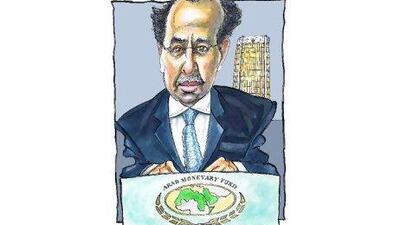Relaxation is a rare commodity for Jassim Al Mannai. If he's not working late in Abu Dhabi or travelling the Arab world to meet officials, his Fridays are often interrupted by phone calls from ministers.
"There's very little time to relax," admits the director general of the Arab Monetary Fund (AMF).
With 22 member countries flung across several time zones, Mr Al Mannai and his staff are often busy attending to all their needs. Based in Abu Dhabi, the AMF provides soft loans and technical macroeconomic assistance to its members.
"With North African nations like Morocco or Mauritania there is a four or five-hour time difference so when we leave the office we may be receiving telephone calls into the night," he says.
"And some Arab countries work on Fridays, which is supposed to be our weekend, so I keep receiving telephone calls from Lebanon, Morocco and Tunisia."
Asked if he always takes the call, Mr Al Mannai is unequivocal.
"I have to," he insists. "I cannot tell them, 'sorry I'm on my holiday or break'. If a minister calls me on an important matter sometimes I have to come back to the office and ask the secretary to come to respond to my duties."
When he finally does get time to unwind, the father of two is equally unequivocal about how he spends it.
"I enjoy time with the family," he answers immediately. "We enjoy having meals outside. Also, I exercise to keep up with the pressure and busy schedule."
His exercise regime involves walking for 45 minutes in Abu Dhabi.
His schedule has become progressively more hectic this year as political turmoil swept across parts of the Arab world. After the seeds were sown in Tunisia in January, social and political unrest spread to Egypt, Bahrain, Oman, Morocco, Libya and Algeria - almost a third of the AMF's member states.
The scale of the movement caught global institutions such as the IMF and the World Bank by surprise. In contrast, Mr Al Mannai says the AMF had for years been urging its members to tackle unemployment and poverty, two of the problems at the root of some of the unrest.
In light of the instability, both Washington organisations have vowed to reconsider the way they assess the health of the region.
"We were aware of the situation in the Arab countries [before the unrest]," he says. "We are probably closer to the situation than other Arab countries.
"I'm glad the IMF and World Bank are reconsidering their approach to these Arab countries," he says.
"Through these revolutions they have discovered that the previous approach focusing only on economic growth as the lead indicator of economic success was not right. If you take the example of Tunisia and Egypt, although they achieved relatively high economic growth, they didn't address major economic problems. Poverty, for instance is still flagrant, unemployment is still very high, income disparity is still prohibitive."
Mr Al Mannai recently returned from a trip to Egypt where he met ministers to discuss their needs. The AMF supplied about US$540 million (Dh1.98 billion) in loans last year and expects to lend a similar amount this year if Egypt and Tunisia seek help in plugging holes in their budgets.
While Mr Al Mannai has been monitoring the unrest in all economies, he has a personal interest in events in Bahrain. A Bahraini national, he has been closely following the instability even though he has not lived or worked in the kingdom for a quarter of a century. He has brothers and sisters still living there and is upbeat about the kingdom's future.
"I cannot see why we should not be optimistic," he says. "From a financial or economic point of view I don't see the problem. Politically, they might need to improve dialogue with the opposition, political practices, but I think it is achievable."
Mr Al Mannai is optimistic about the future following the Arab Spring.
"It's a positive thing," he says. "When you talk about reform you need to make sure there is transparency and disclosure, the competition should not be monopolised by a few people," he says. "You would like to see clean practices, no conflict of interest."
After education at the University of Paris Sorbonne and training at Harvard Business School in Boston, Mr Al Mannai worked in finance for Chase Manhattan Bank in New York.
He returned to his homeland to work in various positions in Bahrain's ministries of finance and national economy, and development and industry. A move to become the executive vice president of Gulf Investment Corporation in Kuwait followed. A background spanning both economics and finance meant he was well placed to take over the position of the director general of the AMF in 1994.
"I have an economist background," he says. "I have different careers but all in finance and economics and I'm glad I've been attached to the Arab region in this job or the previous job."
Even after 17 years at the helm, Mr Al Mannai still enjoys the rigours of the position.
"It's a very interesting job," he says. "What's important is to be close to our member countries, entertaining with them and understanding how this institution can be better to them, understanding better their culture. We deal with many different partners - ministers of finance, ministers of economy, central banks, commercial banks, economic institutions."
It's this interest in the job that ensures Mr Al Mannai has so little time to relax.

